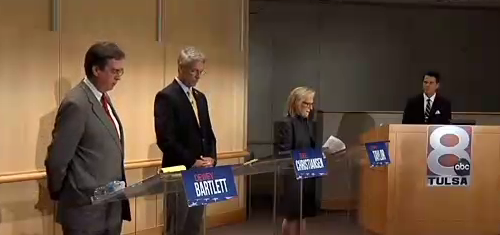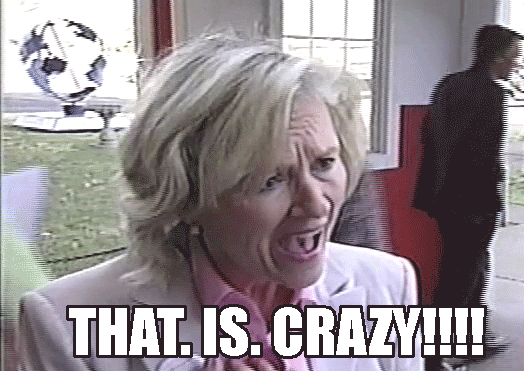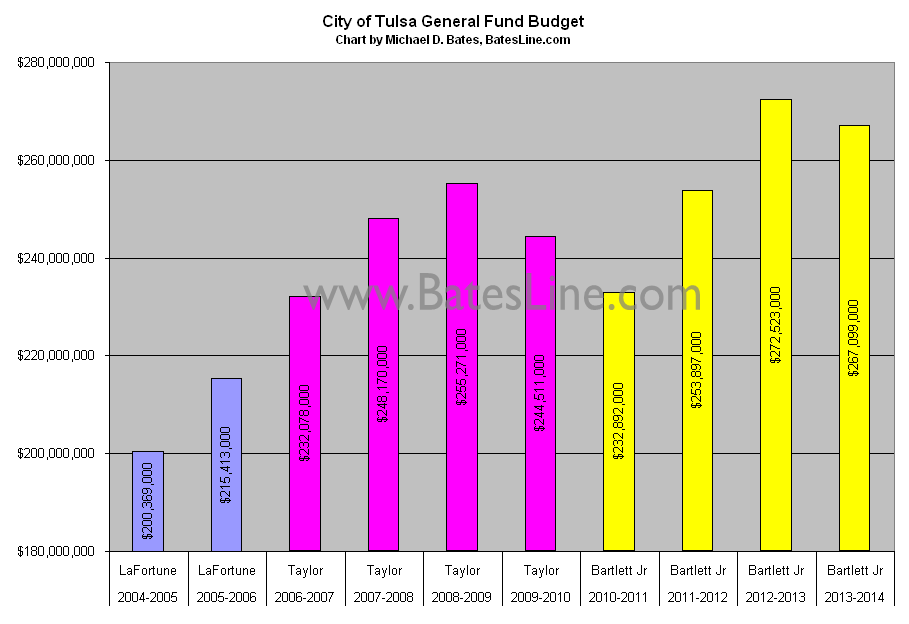Tulsa Election 2013: May 2013 Archives
And why is the Oklahoma Republican Party promoting the fundraiser of one of three Republican candidates in the Tulsa mayor's race? (UPDATE: See below.)
Oklahoma City seems like a very odd place for the Mayor of Tulsa to have a fundraising event. Why not pay a Tulsa hotel and Tulsa caterers and keep those dollars generating sales taxes here?
Below is the invitation, on Oklahoma Republican Party letterhead. That's odd, too. There are three Republican candidates in the mayoral primary (Dewey Bartlett Jr, Jerry Branch, Bill Christiansen) so the state party should not be taking sides at this point. If we wind up with a runoff between a Democrat and a Republican, then it would be fine for the state party to get involved, but helping one candidate raise money at this point violates the spirit, if not the letter, of the state party's rules.
Here's the list of hosts:
Ron Atchley, Mr. & Mrs. G.T. Blankenship, Harold Hamm, MaryAnn & Jack Hodges, Mike McDonald, Jeff McDougall, Ray Potts, Joe Warren, David Willis, Dick Bogert, Barbara & F.W. "Pete" Brown, Frank Harrison, Lance Ruffel and Ronnie Irani
The giving levels at the bottom of the invitation define "host" as a $5,000 donor, which suggests that this may already be a $70,000 event. Why would an Oklahoma City resident want to give that much money to influence an election for Tulsa city government?
Oh, and the fundraising company? Cothran Development, based in Ada.
UPDATE 2013/05/23: Yesterday, the Oklahoma Republican Party sent an invitation to a Saturday fundraiser in Tulsa for Bill Christiansen:
The invitation notes that the fundraiser is "provided by Mark and Anja Rogers, Charlie Meadows, & Dr. Robert and Carrie Zoellner" and lists the following names as the fundraising committee: Lloyd Noble Jr., Dan Keating, Bonnie Latsh, George Gibbs, Mark Tedford, Steve Wood, Lela McCoy, Lori Hamilton-Hobbs, Charlie Meadows, Dr. Robert Zoellner.
My guess is that someone from the Bartlett campaign asked state GOP headquarters for help getting word out about their Oklahoma City fundraiser. State party officials, unaware that there's effectively a Republican primary in progress, complied with the wishes of the incumbent Republican. After some blowback from Christiansen supporters, they extended the same opportunity to Christiansen. That's my speculation. I have seen this sort of thing before -- establishment Tulsa types trick OKC allies into taking sides in an intramural Tulsa dispute by not letting them know that there is a dispute and Republicans on both sides of the issue. Grassroots Republicans would do well to give the state GOP, AFP Oklahoma, and similar groups a heads-up when this is likely to occur.
UPDATE 2013/05/24: KRMG's Steve Berg covers the story and this blog entry.
 Grassroots civic group TulsaNow sent a questionnaire to the candidates for Mayor of Tulsa; Bill Christiansen and Kathy Taylor responded. There were multiple attempts to contact incumbent Dewey Bartlett Jr, but he did not respond.
Grassroots civic group TulsaNow sent a questionnaire to the candidates for Mayor of Tulsa; Bill Christiansen and Kathy Taylor responded. There were multiple attempts to contact incumbent Dewey Bartlett Jr, but he did not respond.
Question topics include delays in PLANiTULSA implementation, police department scandals and rising costs, park demolitions, downtown surface parking, mass transit and bike lanes, and economic development.
Two comments for now:
It was encouraging to see that the idea of a downtown surface parking moratorium has become to conventional wisdom in 2013. It was a way-out idea back in 1998, when, as a city council candidate, I proposed a downtown parking summit among TCC, churches, and office building owners to address demolition for parking. As recently as 2006, the CORE Tulsa report, a collection of very modest measures to encourage preservation and discourage demolition downtown, was spiked by the Tulsa Preservation Commission at the urging of Kathy Taylor's administration. Taylor showed no leadership on the issue when she had the opportunity, as mayor, to do so, and you have to assume that her aide Susan Neal was working on Taylor's behalf.
It was discouraging to realize that all three major candidates are social and fiscal liberals. According to Kathy Taylor's response, extending benefits to same-sex partners of city employees "is one area where all three major candidates expressed agreement at the FOP forum." Bill Christiansen's response failed to answer the question: "Bill Christiansen does not discriminate against anyone and is for inclusivity. Bill practices marriage from the biblical meaning and supports the legal meaning of marriage as it is." No one addressed the problem of cost -- would employees bear the full marginal cost of adding coverage, or would we have to squeeze the city budget to pay part or all of it? -- or the question of verification -- how does the city know that this person is really your "domestic partner" and not just an uninsured acquaintance? And no one hit upon the idea of letting an employee add any adult to insurance, without regard to the existence of a "partnership," which would avoid forcing the taxpayers to bless all kinds of immoral relationships as pseudo-marriage for the purpose of benefits.

KTUL has posted video from Wednesday's League of Women Voters debate between incumbent Mayor Dewey Bartlett Jr, former Councilor Bill Christiansen, and former Mayor Kathy Taylor. It's not all in one piece and their site is a bit difficult to navigate, so here are direct links to each clip. The first five clips were filmed with each candidate individually; the remainder are responses at the debate to questions from the audience:
Qualifications
City budget
Economic development
Public safety
Streets
Tax structure changes
How to attract jobs without an incentive fund
Chloramine in the city water supply
How to attract retail to north Tulsa
PLANiTULSA
Living wage for city employees
How to improve the health of Tulsa residents
Closing remarks
KTUL has posted some post-debate analysis on their site. I haven't watched all of the debate yet. I spent Wednesday evening at an awards ceremony where students in Tulsa Bible Church's Awana chapter were honored for achievements in memorizing Scripture. More important in the long run, I think. Something like 17 high school students were honored for completing the entire, rigorous program. Awana is an international organization; TBC has one of the most active chapters in the country.
Tulsa Mayor Dewey Bartlett Jr has released his proposed budget for the upcoming 2013-2014 fiscal year, which begins July 1. (That's an 8 GB PDF.) The budget is slightly lower than last year, reflecting the drop in revenues that caught Bartlett Jr and his administration by surprise, leading to a hiring freeze for the last quarter of the 2012-2013 fiscal year.
The above chart shows the general fund budget over the last 10 years. The complete city budget includes many other funds, but the general fund is a good apples-to-apples comparison, as it doesn't include fee-for-service funds like trash and water. This is the part of the budget where the mayor has the most control.
What you'll notice is a steep climb in the general fund budget under Taylor and again under Bartlett Jr, with a drop in the middle under both mayors when the 2008 recession hit Tulsa and sales tax revenues plummeted.
Here's the thing to remember about government budgeting in Oklahoma. The Oklahoma State Constitution and state statutes require a balanced budget for the state and all of its political subdivisions. While you can issue bonds for capital improvements, you can't simply get out the credit card to pay for operations when you want to spend more than available revenues. A mayor has to cut spending. There is no other option when revenues are down.
But when times are fat and revenues are flowing, a mayor does have a choice: He or she could show restraint and hold spending increases to the rate of inflation. A few voices -- former City Councilor John Eagleton was the most prominent -- called for restraining the growth of government to the rate of inflation, but those voices were ignored.
The other option: The mayor could expand existing programs, create new programs, and allow spending to increase to consume all available revenues, making cuts all the more painful when revenues contract, as they eventually will.

Kathy Taylor opted for the latter course. Taylor boosted the general fund budget by 18.5% over three years, half again faster than the rate of inflation over the same period (June 2005, when Bill LaFortune's last budget was approved, to June 2008, when Taylor's peak budget was approved). Had Taylor kept her spending increases to the rate of inflation, no cuts would have been necessary -- the 2008-2009 budget would have been $242.3 million instead of the actual amount of $255.3 million, and the actual 2009-2010 budget of $244.5 million would have represented an increase.

Dewey Bartlett Jr was an even bigger spendthrift than Kathy Taylor. He cut when he had to in FY 2010-2011, to stay within available revenues, but then Bartlett Jr's general fund budgets rose 17% in just two years, over a period (June 2010 to June 2012) when the CPI rose only 5%. Once again, had Bartlett Jr held his spending to the rate of inflation, the 2012-2013 budget would have been only $245.2 million.
Had spending been held to the rate of inflation through both the Taylor and Bartlett Jr administrations, the City of Tulsa would have avoided painful budget cuts and would have a fatter rainy day fund.
It's time Tulsa got off of the budget roller coaster and took a more cautious, conservative, and steady approach to city budgeting.
MORE: Download the FY13-14 City of Tulsa Proposed Budget.
Here's a table showing the Consumer Price Index month-by-month going all the way back to 1913.
